
When the markets plunge, every second counts. Investors scramble to make quick decisions—buy, sell, hold—and they need their trading platforms to work flawlessly. But that’s exactly when many investing apps falter. In the heat of a crash, users often face frozen screens, delayed order executions, login errors, and vanishing portfolios. These glitches can cost users real money and undermine trust in platforms that claim to be “built for everyone.”
A market crash isn’t just a test of economic resilience—it’s also a stress test for financial technology. Some apps crack under pressure, exposing serious weaknesses in their infrastructure. This article breaks down eight popular investing apps known to glitch when things get rough.
Whether you’re an active trader or a long-term investor, it pays to know which tools might fail you when you need them most. Staying informed is the first step to protecting your money.
1. Robinhood
Robinhood gained popularity for commission-free trades and an easy-to-use interface, but its track record during market meltdowns is checkered. The platform experienced a major outage in March 2020 during a historic rally following a sharp drop—users couldn’t buy or sell at all. It has since had multiple hiccups during volatile trading days, with delays in order execution and account access. These outages have sparked outrage from users and even lawsuits alleging damages from lost trading opportunities. Despite efforts to improve infrastructure, reliability remains a concern when volatility spikes.
2. Webull
Webull is often seen as a more advanced alternative to Robinhood, but it hasn’t been immune to tech issues during high-traffic moments. During the GameStop frenzy and other fast-moving events, users have reported app crashes, delayed data, and execution problems. Market surges create latency on the platform, which can affect real-time decision-making. For options traders in particular, even a five-second lag can make or break a trade. While Webull continues to grow, its infrastructure seems to lag behind its ambitions.
3. E*TRADE
ETRADE, owned by Morgan Stanley, has a strong reputation and robust tools—but even this heavyweight has stumbled during market chaos. Several high-volume days in recent years have caused log-in failures, slow dashboards, and delayed order status updates. These issues are especially frustrating for active traders relying on ETRADE Pro for precision. Although the company claims to invest in backend improvements, glitches continue to pop up during critical windows. Reliability is inconsistent when volatility spikes beyond normal levels.
4. Fidelity
Fidelity is known for its conservative, reliable image, but that hasn’t shielded it from tech strain during selloffs. Heavy usage has caused the site and app to freeze, locking out users during crucial moments. Transaction delays and reporting lags have been reported by frustrated investors trying to adjust positions. The problem often lies not in total outages, but in slow performance and minor errors compounding under pressure. For an app trusted by long-term investors, these performance issues are quietly eroding confidence.

5. Charles Schwab
Charles Schwab has a strong backend and generally performs well—but even it has buckled under extreme market pressure. During sudden corrections, users have reported issues ranging from login timeouts to quote refresh delays. The platform can struggle to keep up with real-time market data when volumes spike sharply. While not as crash-prone as some competitors, Schwab still has trouble scaling instantly in the face of sudden demand. These moments reveal that even industry stalwarts have blind spots in digital capacity.
6. TD Ameritrade
TD Ameritrade, now part of Charles Schwab, has had repeated issues during high-volatility days, especially with its Thinkorswim platform. Traders have reported freezing charts, lagging order books, and even unfilled orders during key market moves. These aren’t isolated bugs—they often follow predictable patterns during market surges. While TD Ameritrade touts institutional-grade tools, the reliability during actual stress tests has drawn criticism. This raises questions about how well retail traders are being served when every second counts.
7. SoFi Invest
SoFi Invest pitches itself as a sleek platform for beginners, but it’s had notable instability during rocky markets. Technical problems have included unresponsive dashboards, delayed account updates, and order errors. The platform has yet to prove itself during prolonged volatility or major downturns. Many users choose SoFi for its ease of use, but simplicity can come at the cost of performance under pressure. It’s a solid choice in calm times—but far less dependable when things get stormy.
8. Acorns
Acorns, popular for rounding up spare change into investments, isn’t designed for active trading—but even passive investors have felt its glitches during crashes. App slowness, portfolio update delays, and sporadic access issues have all been reported during market upheavals. While users aren’t placing trades by the second, they still expect accurate information and functional access. A lack of communication during these downtimes has only deepened user frustration. Acorns’ minimalist appeal is undermined by a failure to deliver under real stress.
Know Your Platform Before the Next Crash
When the markets crash, emotions run high—but your investing app shouldn’t break down. The reality is, many of the most popular platforms aren’t built to withstand extreme market pressure. Glitches, lag, and outages turn financial tools into liabilities at the worst possible moments. If your platform can’t scale with demand, you risk being locked out when it matters most. Take the time to assess not just features and fees, but also performance under pressure—because your money deserves better.
What do you think? Have you experienced any of these glitches yourself? Share your thoughts or drop a comment below.
Read More
8 Investment “Opportunities” That Experts Say to Avoid This Year
Investing in Your Home: Understanding ROI Benefits
The post 8 Investing Apps That Glitch During Market Crashes appeared first on Everybody Loves Your Money.







